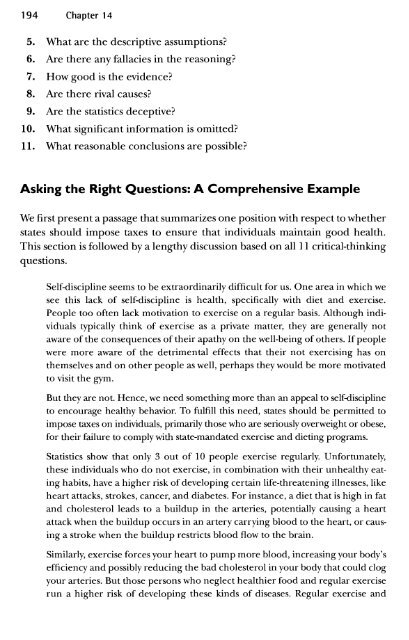Asking the Right Questions, A Guide to Critical Thinking, 8th Ed
Asking the Right Questions, A Guide to Critical Thinking, 8th Ed
Asking the Right Questions, A Guide to Critical Thinking, 8th Ed
You also want an ePaper? Increase the reach of your titles
YUMPU automatically turns print PDFs into web optimized ePapers that Google loves.
194 Chapter 14<br />
5. What are <strong>the</strong> descriptive assumptions?<br />
6. Are <strong>the</strong>re any fallacies in <strong>the</strong> reasoning?<br />
7. How good is <strong>the</strong> evidence?<br />
8. Are <strong>the</strong>re rival causes?<br />
9. Are <strong>the</strong> statistics deceptive?<br />
10. What significant information is omitted?<br />
11. What reasonable conclusions are possible?<br />
<strong>Asking</strong> <strong>the</strong> <strong>Right</strong> <strong>Questions</strong>: A Comprehensive Example<br />
We first present a passage that summarizes one position with respect <strong>to</strong> whe<strong>the</strong>r<br />
states should impose taxes <strong>to</strong> ensure that individuals maintain good health.<br />
This section is followed by a lengthy discussion based on all 11 critical-thinking<br />
questions.<br />
Self-discipline seems <strong>to</strong> be extraordinarily difficult for us. One area in which we<br />
see this lack of self-discipline is health, specifically with diet and exercise.<br />
People <strong>to</strong>o often lack motivation <strong>to</strong> exercise on a regular basis. Although individuals<br />
typically think of exercise as a private matter, <strong>the</strong>y are generally not<br />
aware of <strong>the</strong> consequences of <strong>the</strong>ir apathy on <strong>the</strong> well-being of o<strong>the</strong>rs. If people<br />
were more aware of <strong>the</strong> detrimental effects that <strong>the</strong>ir not exercising has on<br />
<strong>the</strong>mselves and on o<strong>the</strong>r people as well, perhaps <strong>the</strong>y would be more motivated<br />
<strong>to</strong> visit <strong>the</strong> gym.<br />
But <strong>the</strong>y are not. Hence, we need something more than an appeal <strong>to</strong> self-discipline<br />
<strong>to</strong> encourage healthy behavior. To fulfill this need, states should be permitted <strong>to</strong><br />
impose taxes on individuals, primarily those who are seriously overweight or obese,<br />
for <strong>the</strong>ir failure <strong>to</strong> comply with state-mandated exercise and dieting programs.<br />
Statistics show that only 3 out of 10 people exercise regularly. Unfortunately,<br />
<strong>the</strong>se individuals who do not exercise, in combination with <strong>the</strong>ir unhealthy eating<br />
habits, have a higher risk of developing certain life-threatening illnesses, like<br />
heart attacks, strokes, cancer, and diabetes. For instance, a diet that is high in fat<br />
and cholesterol leads <strong>to</strong> a buildup in <strong>the</strong> arteries, potentially causing a heart<br />
attack when <strong>the</strong> buildup occurs in an artery carrying blood <strong>to</strong> <strong>the</strong> heart, or causing<br />
a stroke when <strong>the</strong> buildup restricts blood flow <strong>to</strong> <strong>the</strong> brain.<br />
Similarly, exercise forces your heart <strong>to</strong> pump more blood, increasing your body's<br />
efficiency and possibly reducing <strong>the</strong> bad cholesterol in your body that could clog<br />
your arteries. But those persons who neglect healthier food and regular exercise<br />
run a higher risk of developing <strong>the</strong>se kinds of diseases. Regular exercise and



